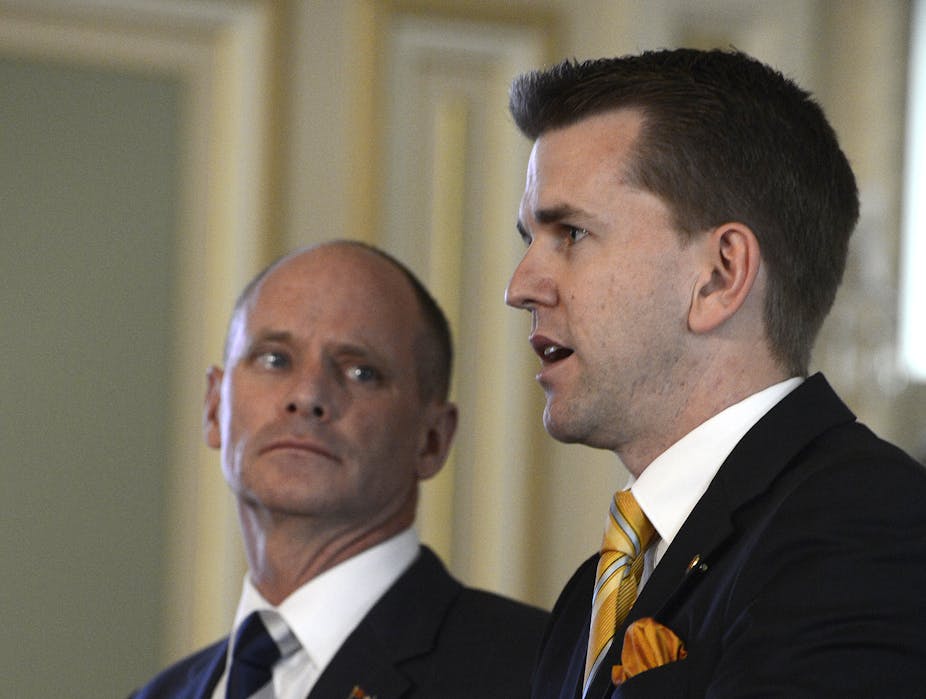Queensland solicitor-general Walter Sofronoff QC resigned last week. He has now revealed his outrage at the conduct of Queensland attorney-general Jarrod Bleijie. Bleijie has appeared willing to breach confidences of his closest legal advisers (including judges and the solicitor-general) for short-term political gain.
This is not a problem unique to Queensland. The solicitor-general is a key position in every Australian government and its politicisation undermines the integrity of governance.
The solicitor-general performs two functions. The first is as the government’s chief advocate, appearing in the High Court to represent the government in important cases. Second, the solicitor-general is the government’s chief legal adviser. His or her advice is often the last word on the limits of government action.
Independence and legal skill and acumen are vital characteristics for any solicitor-general, the state’s “second law officer” who represents and advises the attorney-general, the “first law officer”. The Commonwealth and every state and territory have both officers. The relationship between the two is vital to the functioning of government under the rule of law.
Bleijie’s actions in recent weeks provide a highly cautionary tale. He claimed that Sofronoff was just ready to “move on”. But in his letter published today, Soronoff expresses outrage at Bleijie’s breach of the confidence of Court of Appeal President Margaret McMurdo, who advised Bleijie on who might best fill an appointment.
Sofronoff wrote:
The possibility that such highly confidential conversations could become public would have an instant chilling effect on the willingness of others to participate in an essential process. Mouths would close and tongues would be stilled.
Sofronoff questioned Bleijie’s motives, writing that “he is prepared to betray a confidence for momentary personal advantage”. He asks:
Who will now be prepared to consult with him candidly about the demerits of candidates for judicial office (except for the coterie of sycophants who surround every person with power to confer advantages)?
Use and abuse of advice
Sofronoff is one of Australia’s hardest-hitting and most effective advocates. His advocacy on behalf of the Wik peoples in the 1990s is the stuff of legal legend. His advocacy for Queensland in the High Court challenge to the National School Chaplaincy Program was pivotal in changing the law on unregulated Commonwealth spending. When Sofronoff speaks, the High Court listens.
It was reported last month that Sofronoff was the “architect” of Queensland’s anti-bikie laws. These include the Vicious Lawless Association Disestablishment Act, which is now under challenge in the High Court.
This reported claim came after heavy criticism that Bleijie had rushed the laws. The attorney-general was presented as an inexperienced legal officer (his youth and background in conveyancing were frequently mentioned) who failed to consult properly on the measures’ effectiveness and whether the incursions on fundamental rights were justified.
Sofronoff’s advice that Queensland needed stronger laws to combat organised crime seemed to provide Bleijie with an important political counter to these criticisms.
The advice was provided in September 2013. In February it was leaked to the Courier-Mail, which published selected extracts. Bleijie also gave an interview in which he indicated that he had accepted most of Sofronoff’s advice in introducing the laws. Bleijie thereby appeared to give his imprimatur to the Courier-Mail’s description of Sofronoff as the true architect of the laws.
Sofronoff was overseas and made no comment. Even if he had been in Australia it would have been unusual to provide public comment.
Political responsibility for decisions
A fundamental aspect of the solicitor-general’s role is to advise the government on significant legal issues. That advice will, by and large, be legal in nature. But it may also properly venture into the policy arena where questions of legal and constitutional policy are in play. It would seem this was the nature of Sofronoff’s advice on organised crime.
The important thing to remember here is that the attorney-general makes the decisions. For our system of government to work properly, it must be this way. The attorney-general is responsible for the decisions once taken, informed by frank and fearless advice from public servants and other officers, including the solicitor-general.
It is irresponsible to attempt to deflect that responsibility for decisions. Yet this is not the first time in recent history that a government has used the solicitor-general as a political football. Every time government does so, the office suffers.

In 2011, the Commonwealth solicitor-general, Stephen Gageler SC (now Justice Gageler of the High Court), was also used as political cover. The High Court struck down the minister’s declaration approving Malaysia as a country where asylum seekers could be sent for processing. Prime minister Julia Gillard and immigration minister Chris Bowen claimed they had received advice that the government had a strong case and accused the court of turning the law on its head.
It was widely thought the solicitor-general was the author of this advice. Some media outlets so heavily criticised Gageler’s lawyering skills that the legal profession felt it necessary to come to his defence. A letter in The Australian defended Gageler as “a lawyer of the very highest competence and integrity” (the signatories included those who had appeared for the asylum seekers in the case).
The government didn’t deny that Gageler provided the advice and he didn’t comment publicly. However, it has been reported that Gageler never provided that advice. Nonetheless, the perception that he gave the advice provided the government with very good cover in a politically difficult situation.
Politicisation of the solicitor-general risks undermining the independence from government and public confidence in the role of the first and second law officers. Not to mention, as Sofronoff points out, it may reduce the quality of candidates interested in the position or, at the least, the extent to which they provide candid advice.
What we have seen in recent weeks is short-term politics at the expense of the rule of law and accountable government.

